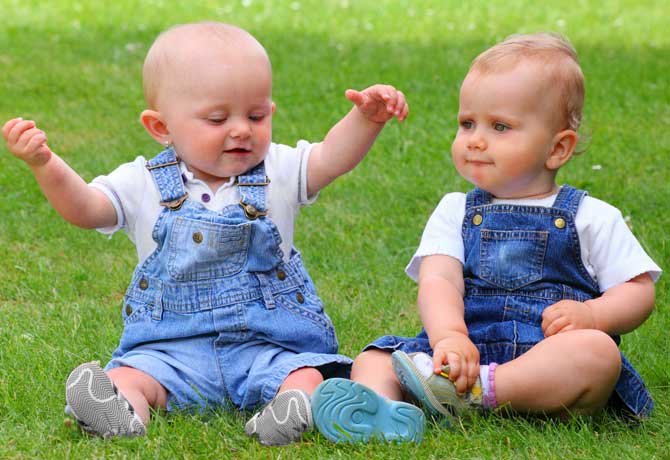Language Development Milestones – Encouraging Language Development in Babies
As a Speech-Language Pathologist, I typically work with children starting at around 18 months. When my daughter was born 4 months ago, I quickly began thinking of how I could encourage her language development right from the start! Don’t worry, there is plenty of time to help your child become the next baby Einstein.
Here are a few strategies caregivers can implement right away to help encourage your baby’s language development. I think you can make a big impact during these early childhood development stages.
1) Imitate! Imitate! Imitate! Imitate everything your baby does, including eye contact, facial expressions, gestures and all of those adorable vocalizations your baby is making. WHY? Imitation is one of the most rewarding things you can do with your baby. Imitation is one of the earliest stages of language development. Imitating things your baby is doing, naturally motivates them to continue doing it! Sharing the same focus with your child encourages them to look at you, promotes social skills, helps your child learn to lead and perhaps most importantly, encourages your child to imitate YOU!
2) Reinforce all your baby’s early “communication” attempts by maintaining eye contact, responding with speech and imitating their vocalizations. WHY? By responding to your baby’s communication attempts you are actually encouraging them to communicate MORE. Simple as that! At the same time, you are also teaching them basic conversational skills.
3) Encourage your baby to experiment with different sounds including various vowel sounds and early consonant-vowel combinations (e.g. “ma”, “ba” and “da”). WHY? Sounds are the building blocks for speech and babies need lots of practice! Encouraging them to make a variety of sounds only helps this process and imitating them actually increases the amount of sounds they make.
4) Vary the pitch of your voice when talking to your baby. WHY? Babies respond better and pay more attention to varying pitch. Keeping your baby interested will help them acquire more language. Keep in mind that this “baby” or “caregiver” talk will not hinder your baby’s speech and language development. As babies get older and begin to understand the words that are being said, this variation in pitch is no longer needed to maintain their attention.
5) Sing songs with gestures such as the “Itsy Bitsy Spider” or “Wheels on the Bus.” WHY? Incorporating simple gestures into the songs you sing with your baby increases their interest in them. Additionally, as your baby learns to imitate gestures, it gives them a way to participate with you in the music. Stopping the song and waiting at key moments gives your baby time to react and join in, whether that is by smiling, cooing or making a gesture.
6) Talk! Talk! Talk! Talk to your baby about what you are doing, what they see, where you are going and what you will do when you get there. WHY? Babies love to hear us talk! Talking to your baby helps them build their vocabulary and language skills by learning to associate words with meaning. It also helps build memory and nonverbal cognitive skills such as problem solving. Narrating your daily routines also teaches babies what to expect and eventually helps them build trust and comforts them in times of distress.
7) “Read” books with your baby. WHY? Even if your baby doesn’t understand the words, they will still enjoy looking at the pictures. Reading at an early age will help your baby develop an interest in books, and also builds early literacy skills such as direction of print, how to hold a book and associating words with pictures. Even if you don’t read the story, describing pictures also helps build vocabulary by introducing concepts such as numbers, colors, shapes and animals in an exciting way. Encourage your baby to look, point and answer questions in whatever way they can. You will be so happy to watch your infant developmental milestones be reached and exceeded!











